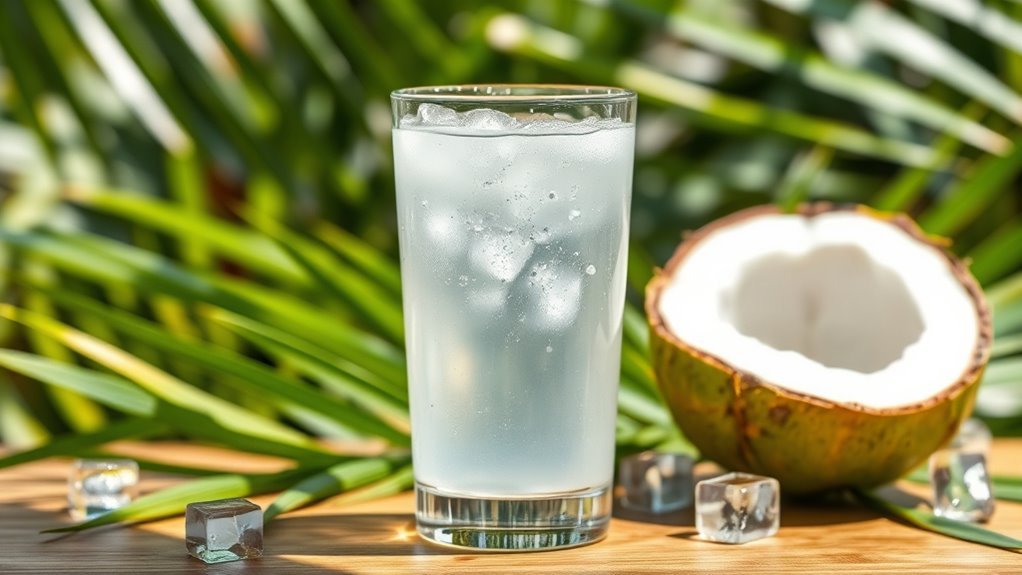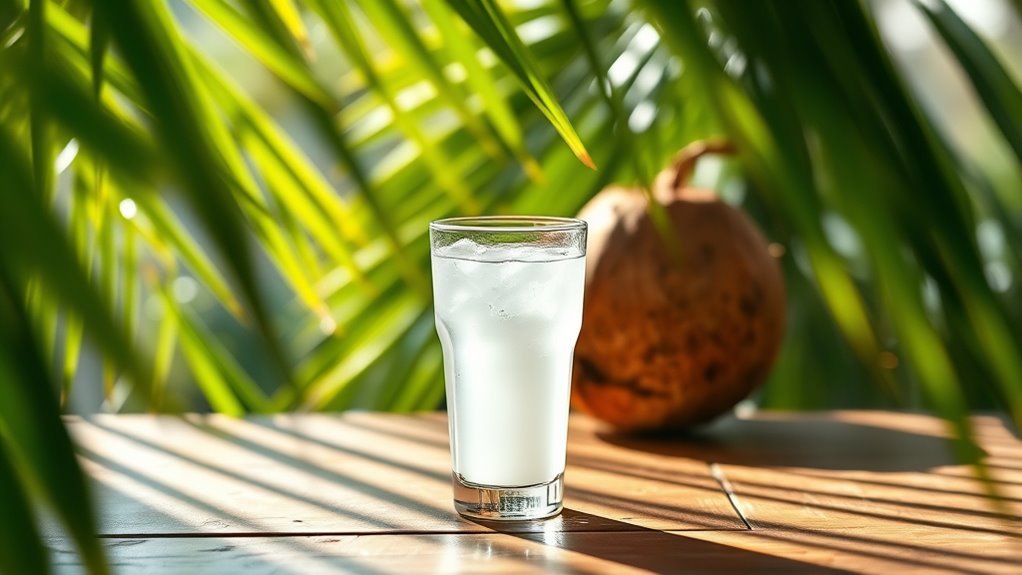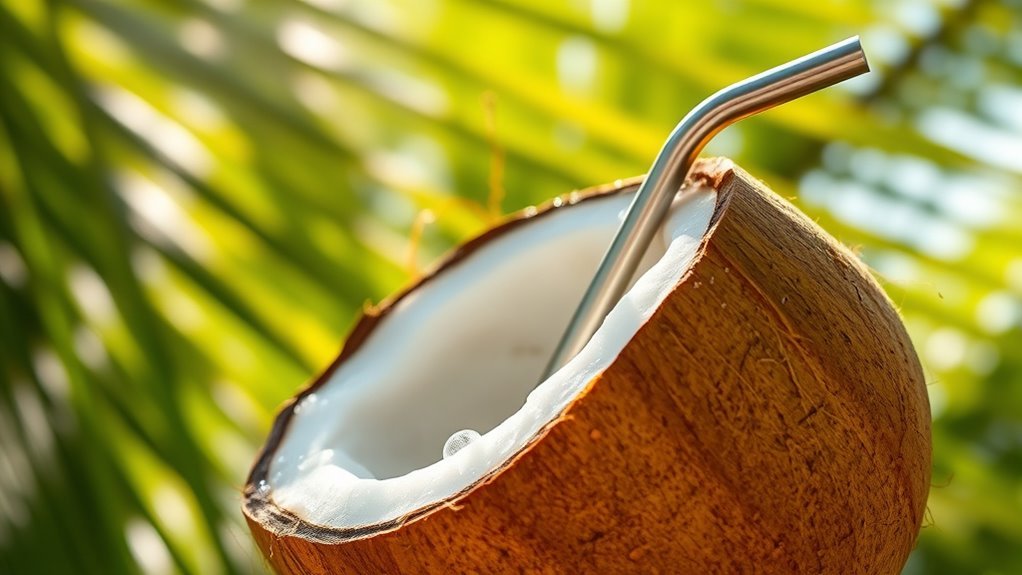Coconut water isn’t considered keto-friendly due to its carbohydrate content, which is around 9 grams per cup. If you’re following a strict ketogenic diet, this can disrupt your carb limits. However, you might still enjoy it in moderation as a hydrating option post-workout or when mixed into recipes. Just keep an eye on your overall intake to stay within your goals. There’s more to explore about incorporating coconut water into your keto lifestyle.
Understanding the Ketogenic Diet

Although you may have heard a lot about the ketogenic diet, understanding its core principles is essential to determine what foods fit within this framework. At its heart, the ketogenic diet focuses on low carbohydrate intake, high healthy fats, and moderate protein. This macronutrient ratio forces your body into a state of ketosis, where it burns fat for fuel instead of carbohydrates. There are several diet variations, such as cyclical or targeted ketogenic diets, each catering to different lifestyles or fitness goals. Familiarizing yourself with these ketogenic principles helps you make informed choices about what to eat, empowering you to pursue a lifestyle that aligns with your health objectives while enjoying a sense of freedom in your dietary decisions.
Nutritional Profile of Coconut Water

Coconut water has a unique nutritional profile that includes a specific macronutrient breakdown and a rich electrolyte content. With its low calorie and carbohydrate content, it can be an interesting option for those monitoring their macros. Additionally, the presence of electrolytes like potassium and sodium makes it a hydrating choice, especially after exercise.
Macronutrient Breakdown
When considering the nutritional profile of coconut water, it is important to examine its macronutrient breakdown, especially if you’re following a keto diet. Coconut water primarily consists of water and natural sugars, with about 9 grams of carbohydrates per cup. This high carbohydrate content can disrupt your macronutrient ratios, making it challenging to maintain ketosis. While it can be a invigorating option for rehydration, relying solely on coconut water as a hydration strategy may not align with your goals. If you’re seeking to stay keto-friendly, it’s essential to balance your intake with lower-carb alternatives. Ultimately, understanding this breakdown will help you make informed choices that support your dietary freedom while staying within your macro limits.
Electrolyte Content
Many people appreciate coconut water for its invigorating taste, but it’s also worth noting its impressive electrolyte content. Rich in potassium, magnesium, and sodium, it can play a key role in maintaining your electrolyte balance, especially after workouts or in hot weather. This makes coconut water a great addition to your hydration strategies, providing a natural alternative to sports drinks. While it contains natural sugars, its overall benefits might outweigh concerns for those not strictly adhering to a keto diet. You’ll find that incorporating coconut water into your routine can enhance your hydration and replenish essential minerals, giving you the freedom to enjoy a revitalizing beverage without compromising on health. Just be mindful of portion sizes!
Carbohydrate Content in Coconut Water

With approximately 9 grams of carbohydrates per 1 cup serving, coconut water is notable for its moderate carb content. If you’re considering coconut water benefits, it’s crucial to weigh its carb levels against your dietary goals. While those on a strict keto diet typically aim for under 20 grams of carbs daily, enjoying a small serving of coconut water might fit into your plan if managed wisely. Its natural sugars can provide a quick energy boost, but be mindful of your overall intake. For many, the invigorating taste and hydration benefits can be worth the trade-off. Ultimately, whether it’s keto diet compatibility depends on how you incorporate it into your daily carb allowance without exceeding your limits.
Comparing Coconut Water to Other Beverages
When you’re considering coconut water alongside other beverages, it’s important to look at their nutritional profiles and carbohydrate content. For instance, while coconut water is hydrating and has some electrolytes, it also contains more carbs than options like plain water or unsweetened tea. Evaluating these differences will help you make informed choices that align with your dietary goals.
Nutritional Profile Comparison
While coconut water is often touted for its health benefits, it’s essential to compare its nutritional profile with other popular beverages to understand its place in a balanced diet. Coconut water offers hydration benefits due to its high electrolyte content, making it an invigorating choice after workouts. However, when you stack it against options like plain water or herbal teas, its nutrient density might not seem as impressive. For example, while coconut water provides potassium and small amounts of vitamins, it contains more calories and sugar than water. On the other hand, unsweetened teas can offer antioxidants without added sugars. Ultimately, choosing the right beverage comes down to your health goals and personal preferences, balancing hydration with nutrient needs.
Carb Content Analysis
Coconut water’s popularity can partly be attributed to its invigorating taste and perceived health benefits, but its carbohydrate content raises questions for those following a ketogenic diet. With about 9 grams of carbs per cup, it doesn’t fit the typical keto profile. Let’s compare its carb content with some other beverage options.
| Beverage | Carbohydrates (per 1 cup) |
|---|---|
| Coconut Water | 9g |
| Almond Milk (unsweetened) | 1g |
| Unsweetened Tea | 0g |
| Sparkling Water | 0g |
| Coconut Milk (canned) | 6g |
If you’re looking for coconut water alternatives, unsweetened tea or almond milk are solid keto beverage options, keeping your carb intake in check.
Hydration Alternatives Evaluation
How do hydration needs change when you’re following a ketogenic diet? Staying hydrated is essential, especially as your body adjusts to utilizing fat for fuel. Here are some hydration strategies to take into account:
- Electrolyte-rich beverages: Choose drinks high in potassium, magnesium, and sodium to maintain electrolyte balance.
- Bone broth: This nutrient-dense option provides hydration and essential minerals, making it a keto-friendly choice.
- Herbal teas: Naturally low in carbs, herbal teas can enhance hydration without impacting your ketosis.
- Sparkling water: A rejuvenating alternative that keeps you hydrated without added sugars or carbs.
While coconut water offers some benefits, assessing these alternatives can help you meet your hydration needs effectively on a ketogenic diet.
Health Benefits of Coconut Water
Although many people enjoy coconut water for its invigorating taste, it also offers several health benefits that make it a popular choice among health enthusiasts. Rich in electrolytes, coconut water provides excellent hydration support, especially after workouts or on hot days. It contains potassium, magnesium, and calcium, which can help maintain proper muscle function and heart health. Additionally, the presence of antioxidants in coconut water may aid in reducing oxidative stress in your body. The unique composition of coconut water promotes better nutrient absorption, making it easier for your body to utilize the vitamins and minerals from other foods. Overall, incorporating coconut water into your diet can be a revitalizing way to enhance your hydration and overall well-being.
Potential Drawbacks of Coconut Water on Keto
While coconut water has its health benefits, it’s important to take into account its potential drawbacks for those following a keto diet. Here are some coconut water drawbacks you should consider:
- Carbohydrate Content: Coconut water contains around 9 grams of carbs per cup, which can quickly add up against your keto diet limitations.
- Sugar Levels: It has natural sugars that may spike your blood sugar, making it less ideal for maintaining ketosis.
- Caloric Intake: With around 46 calories per cup, it could hinder weight loss goals if consumed in excess.
- Hydration Balance: Relying solely on coconut water for hydration may not provide the electrolytes you need on keto.
Being aware of these drawbacks can help you make informed choices on your keto journey.
How to Incorporate Coconut Water in a Keto Diet
Incorporating coconut water into a keto diet can be done carefully, allowing you to enjoy its invigorating taste without derailing your carb limits. To maximize its benefits, consider using coconut water in moderation and pairing it with low-carb coconut recipes. Here are some hydration tips to help you balance your intake:
| Serving Size | Carbohydrates | Suggested Use |
|---|---|---|
| 1 oz | 1.2g | Mix in smoothies |
| 4 oz | 5g | Post-workout drink |
| 8 oz | 10g | Dilute with water |
| 2 oz | 2.5g | Flavor for salad dressings |
| 6 oz | 8g | Add to coconut recipes |
Alternatives to Coconut Water for Hydration
For those seeking hydration options beyond coconut water, several alternatives can effectively replenish your fluids while fitting into a keto lifestyle. Here are four great options:
- Herbal Teas: Naturally low in calories and carbs, herbal teas can be enjoyed hot or cold, providing a flavorful hydration boost.
- Sparkling Water: This bubbly alternative adds zest to your hydration routine without any added sugars or carbs.
- Electrolytic Drinks: Look for keto-friendly electrolyte drinks that maintain your mineral balance without the sugars found in many commercial options.
- Vegetable Juices: Low-carb vegetable juices can be invigorating and nutrient-rich, making them a solid choice for hydration.
Exploring these alternatives can help keep you hydrated while staying committed to your keto goals.
Final Thoughts on Coconut Water and Keto
As you navigate your keto journey, it’s essential to weigh the pros and cons of coconut water. While it offers several coconut water benefits, including electrolytes for keto hydration, it also contains natural sugars that can impact your carb intake.
| Benefits | Considerations |
|---|---|
| Hydration support | Contains sugars |
| Electrolyte balance | May affect ketosis |
| Natural flavor | Higher calories |
| Nutrient-rich | Not a keto staple |
In moderation, coconut water can be enjoyed, especially post-exercise. However, if you’re strictly monitoring your carbs, you might want to explore other hydration options. Always remember, balance is key to enjoying your keto lifestyle without feeling restricted.
Frequently Asked Questions
Can I Drink Coconut Water on a Strict Keto Diet?
You might want to limit coconut water on a strict keto diet due to its higher carb content. While it offers hydration and electrolytes, its benefits may not align with your low-carb goals. Instead, consider keto alternatives like unsweetened coconut milk or electrolyte supplements, which can provide similar hydration without the extra carbs. It’s all about finding balance; enjoy the benefits while staying within your dietary preferences!
What Are the Best Times to Drink Coconut Water?
The best times to drink coconut water are during post-workout recovery and throughout the day for hydration. It’s packed with electrolytes, making it a great choice after intense exercise to replenish lost fluids. If you’re looking for the best hydration option, sipping on coconut water can keep you refreshed and energized. Just be mindful of your overall carb intake if you’re following a specific diet, like keto, to maintain your goals.
Does Coconut Water Contain Any Added Sugars?
Yes, some coconut water brands do contain added sugars, which can inflate their sugar content. It’s important to read the labels carefully. While pure coconut water is naturally sweet, many products mix in sweeteners or flavorings, so you might not realize how much sugar you’re consuming. If you’re aiming for a healthier choice, opt for brands that offer 100% natural coconut water without any additives, giving you the freedom to enjoy without guilt.
Is Coconut Water Safe for Diabetics on Keto?
Coconut water can be safe for diabetics on keto, but moderation is key. It offers hydration benefits and essential electrolytes, which can be helpful for managing blood sugar levels. However, it contains natural sugars, so you’ll want to monitor your intake carefully. Balancing hydration with your dietary goals is vital. Always consult with a healthcare professional to confirm it fits your personal health needs and keto lifestyle. Enjoy the benefits, but stay mindful!
How Does Coconut Water Taste Compared to Other Drinks?
Imagine sipping a revitalizing coconut drink while lounging on a tropical beach. Coconut water’s flavor profile is subtly sweet with a hint of nuttiness, making it a unique alternative to sugary sodas or artificial juices. Compared to other drink alternatives, it’s light and hydrating, often praised for its natural electrolytes. If you’re seeking a revitalizing beverage, coconut water offers a delightful balance that can elevate your hydration game without overwhelming your palate.
Frequently Asked Questions about Coconut Water and Keto
1. Is coconut water keto friendly?
Coconut water is not considered keto friendly due to its carbohydrate content. A typical serving (about 8 ounces) contains approximately 9 grams of carbohydrates, which can take up a significant portion of the daily carb allowance for those following a strict ketogenic diet. While it offers hydration and electrolytes, it is best consumed in moderation if at all on a keto diet.
2. What are the nutritional benefits of coconut water?
Coconut water is rich in potassium, sodium, and magnesium, making it an excellent natural electrolyte drink. It is low in calories and contains antioxidants that can help reduce oxidative stress. Additionally, coconut water is hydrating and can support digestion due to its natural enzymes. However, the benefits should be balanced against its carbohydrate content for those on a keto diet.
3. Can I drink coconut water while on a low-carb diet?
If you are on a low-carb diet rather than a strict ketogenic diet, you may be able to include coconut water in moderation. It’s essential to monitor your total carbohydrate intake and see how coconut water fits into your daily macro goals. Opt for unsweetened versions to avoid added sugars, and consider limiting your serving size to maintain lower carb levels.
4. Are there keto-friendly alternatives to coconut water?
Yes, there are several keto-friendly alternatives to coconut water. Options include plain water, sparkling water, or electrolyte drinks specifically formulated for a ketogenic diet that are low in carbohydrates. You can also hydrate with herbal teas or infuse water with low-carb fruits like lemon or cucumber for added flavor without the carbs found in coconut water.
5. What should I consider when choosing beverages on a keto diet?
When choosing beverages on a keto diet, focus on options that are low in carbohydrates and sugars. Read labels carefully, as many drinks can have hidden sugars. Hydration is key, so prioritize water, unsweetened teas, or electrolyte-infused drinks that align with keto guidelines. Always consider the nutritional content and how it fits into your overall daily carb allowance.
References
- https://www.healthline.com/nutrition/coconut-water-keto
- https://www.verywellfit.com/coconut-water-nutrition-facts-5116840
- https://www.ncbi.nlm.nih.gov/pmc/articles/PMC4880342/
- https://www.webmd.com/diet/what-is-coconut-water
- https://www.medicalnews
- https://www.eatthis.com/coconut-water-keto/
- https://www.ncbi.nlm.nih.gov/pmc/articles/PMC3538976/


